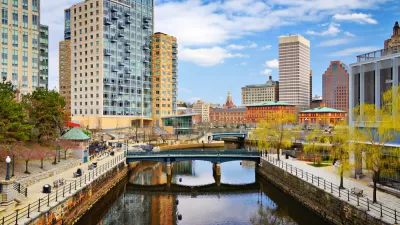The global engineering firm envisions a "smart" building that will plug into "smart" urban infrastructure and cater to an increasingly dense and technology-savvy urban population.
In its January 2013 issue of Foresight [PDF], the engineering firm Arup imagines the urban building of the near future, pegging its design on the following question:
"As city living takes center stage, what will we come to expect from the design and function of urban structures and buildings?"
The essential characteristics of this urban structure adapted to the needs of society in the year 2050 include: flexible structures, the cultivation of sustainable resources, reactive facades, community integration and smart systems.
Manifesto-like and predicated on meeting the needs of a realtime technology-savvy dense urban population in constant flux and facing demographic shifts and natural resource scarcity, this uber building features modular components, phase change materials, timber-based structural framing, photovoltaics in paint form, algae bio-fuel cells, urban food production layers with integrated water collection and filtration systems, a building membrane that converts CO2 to oxygen through nanoparticles and provides interior climate control, communal space, data networking and integrated shared transportation systems.
The building functions as a "smart environment" linked into the urban infrastructure and is self-repairing through automated systems and onsite digital fabrication resources, which allow for customization.
FULL STORY: Arup presents skyscrapers with brains

Maui's Vacation Rental Debate Turns Ugly
Verbal attacks, misinformation campaigns and fistfights plague a high-stakes debate to convert thousands of vacation rentals into long-term housing.

Planetizen Federal Action Tracker
A weekly monitor of how Trump’s orders and actions are impacting planners and planning in America.

In Urban Planning, AI Prompting Could be the New Design Thinking
Creativity has long been key to great urban design. What if we see AI as our new creative partner?

Massachusetts Budget Helps Close MBTA Budget Gap
The budget signed by Gov. Maura Healey includes $470 million in MBTA funding for the next fiscal year.

Milwaukee Launches Vision Zero Plan
Seven years after the city signed its Complete Streets Policy, the city is doubling down on its efforts to eliminate traffic deaths.

Portland Raises Parking Fees to Pay for Street Maintenance
The city is struggling to bridge a massive budget gap at the Bureau of Transportation, which largely depleted its reserves during the Civd-19 pandemic.
Urban Design for Planners 1: Software Tools
This six-course series explores essential urban design concepts using open source software and equips planners with the tools they need to participate fully in the urban design process.
Planning for Universal Design
Learn the tools for implementing Universal Design in planning regulations.
Gallatin County Department of Planning & Community Development
Heyer Gruel & Associates PA
JM Goldson LLC
City of Camden Redevelopment Agency
City of Astoria
Transportation Research & Education Center (TREC) at Portland State University
Jefferson Parish Government
Camden Redevelopment Agency
City of Claremont





























